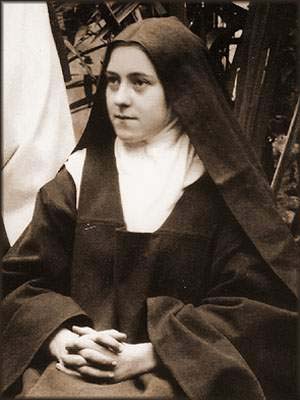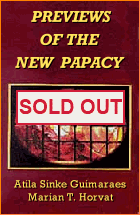Catholic Virtues
 |
 |
 |
 |
 |
 |
 |
An Unknown Prophecy of St. Therese
Not many people, even those most devoted to her, think of St. Thérèse of Lisieux, the Little Flower, as a prophet. But this is not surprising when one recalls the many passages in her Autobiography, The Story of a Soul, where she tells of her love for nature, particularly flowers and birds.
She described one day when she went fishing with her dear Papa, and “the beautiful blue sky became suddenly overcast and soon the thunder began to roll and the lightning to flash through the dark clouds. I saw it strike a short distance away, and far from being frightened, I was thrilled with delight because God seemed to be so close!” (1)
Even more significant is the passage in which Thérèse tells of her growing love for learning. Here she describes her state of spirit in her early teens:
“I had always loved the great and the beautiful, but at this epoch in my life I was taken up with an extreme desire for learning. Not satisfied with the lessons and work my teacher was giving me, I applied myself to the some special studies in history and science, and I did this on my own. The other studies left me indifferent, but these two subjects attracted all my attention. In a few months I acquired more knowledge than during my years of study.
 “Ah! This was really only vanity and affliction of spirit. The chapter in the Imitation of Christ which speaks of knowledge came frequently to my mind.” (2)
“Ah! This was really only vanity and affliction of spirit. The chapter in the Imitation of Christ which speaks of knowledge came frequently to my mind.” (2)
Was it not these earlier impressions made by the emphatically empirical and materialistic science of her day (1873-1897) that prompted the Holy Spirit to show her at the end of her life where that knowledge was to lead the world? Darwin’s Origin of the Species had shocked the cultural milieu of Europe only some fourteen years before she was born (1859).
And so, during the August before her ecstatic death of love on September 30, Mother Agnes (her sister Pauline) made this entry in her Notebook:
“One evening, in the infirmary, Thérèse was drawn to confide her troubles to me more than she usually did. She had not yet opened up in this way on this subject. Up until then, I had known her trial of faith only vaguely”. (3)
I interject here the comment that Mother Agnes apparently is speaking here of Thérèse’s trial of faith, not seeing the broader references to the world at large. Unaware, then, of the importance of these words themselves, Mother Agnes failed to record the entire prophecy, for such it was, and simply wrote “etc.” at the end of the following words of Thérèse that she did record:
“If you only knew what frightful thoughts obsess me. Pray very much for me so that I do not listen to the Devil who wants to persuade me about so many lies. It is the reasoning of the worst materialists that is imposed upon my mind. Later, unceasingly making new advances, science will explain everything naturally. We shall have the absolute reason for everything that exists and that still remains a problem, because there remain very many things to be discovered, etc. etc. “ (4)
Although Mother Agnes did not record all of Thérèse’s words concerning the “discoveries” of science, we, in hindsight, can fill in the events she foresaw. The words of Thérèse warn us of the Atheism that the false science of evolutionism produces. It is the fulfillment of what the Encyclical Pascendi of St Pius X describes as the subjugation of Faith to “Science” – to what poses as true science.
St. Thérèse went on to say, as recorded by Mother Agnes, these words:
“Finally, I offer up these very great pains to obtain the light of faith for poor unbelievers, for all those who separate themselves from the Church’s beliefs.” Mother Agnes interjects, “She added that she never reasoned with these thoughts [against Faith].”
In other words, Thérèse did not attempt to argue with the Devil, much less to dialogue with him, as Eve had done.
Thérèse concludes: “I undergo them under duress, but while undergoing them, I never cease making acts of faith.” (5)
St. Thérèse, pray for us who live in the darkness of this false science, that we too never cease making acts of divine Faith in all the Truths of Faith and of Reason.

Posted July 25, 2012
She described one day when she went fishing with her dear Papa, and “the beautiful blue sky became suddenly overcast and soon the thunder began to roll and the lightning to flash through the dark clouds. I saw it strike a short distance away, and far from being frightened, I was thrilled with delight because God seemed to be so close!” (1)
Even more significant is the passage in which Thérèse tells of her growing love for learning. Here she describes her state of spirit in her early teens:
“I had always loved the great and the beautiful, but at this epoch in my life I was taken up with an extreme desire for learning. Not satisfied with the lessons and work my teacher was giving me, I applied myself to the some special studies in history and science, and I did this on my own. The other studies left me indifferent, but these two subjects attracted all my attention. In a few months I acquired more knowledge than during my years of study.

St. Thérèse: her temptations against the Faith would have been influenced by modern science
Was it not these earlier impressions made by the emphatically empirical and materialistic science of her day (1873-1897) that prompted the Holy Spirit to show her at the end of her life where that knowledge was to lead the world? Darwin’s Origin of the Species had shocked the cultural milieu of Europe only some fourteen years before she was born (1859).
And so, during the August before her ecstatic death of love on September 30, Mother Agnes (her sister Pauline) made this entry in her Notebook:
“One evening, in the infirmary, Thérèse was drawn to confide her troubles to me more than she usually did. She had not yet opened up in this way on this subject. Up until then, I had known her trial of faith only vaguely”. (3)
I interject here the comment that Mother Agnes apparently is speaking here of Thérèse’s trial of faith, not seeing the broader references to the world at large. Unaware, then, of the importance of these words themselves, Mother Agnes failed to record the entire prophecy, for such it was, and simply wrote “etc.” at the end of the following words of Thérèse that she did record:
“If you only knew what frightful thoughts obsess me. Pray very much for me so that I do not listen to the Devil who wants to persuade me about so many lies. It is the reasoning of the worst materialists that is imposed upon my mind. Later, unceasingly making new advances, science will explain everything naturally. We shall have the absolute reason for everything that exists and that still remains a problem, because there remain very many things to be discovered, etc. etc. “ (4)
Although Mother Agnes did not record all of Thérèse’s words concerning the “discoveries” of science, we, in hindsight, can fill in the events she foresaw. The words of Thérèse warn us of the Atheism that the false science of evolutionism produces. It is the fulfillment of what the Encyclical Pascendi of St Pius X describes as the subjugation of Faith to “Science” – to what poses as true science.
St. Thérèse went on to say, as recorded by Mother Agnes, these words:
“Finally, I offer up these very great pains to obtain the light of faith for poor unbelievers, for all those who separate themselves from the Church’s beliefs.” Mother Agnes interjects, “She added that she never reasoned with these thoughts [against Faith].”
In other words, Thérèse did not attempt to argue with the Devil, much less to dialogue with him, as Eve had done.
Thérèse concludes: “I undergo them under duress, but while undergoing them, I never cease making acts of faith.” (5)
St. Thérèse, pray for us who live in the darkness of this false science, that we too never cease making acts of divine Faith in all the Truths of Faith and of Reason.
- The Story of a Soul, trans. By J. Clarke, ICS, 1975, pp. 37-38)
- Ibid.., p. 101
- Last Conversations, trans. By J. Clarke, ICS, 1977, p. 257
- Ibid.
- Ibid., pp. 257-258

Posted July 25, 2012











